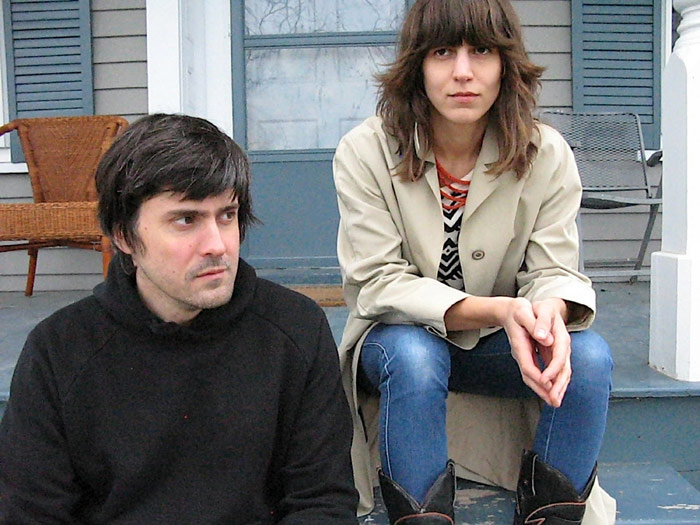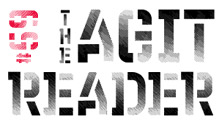
Sibling Revelry
by Kevin J. Elliott
In the six years since Matt and Eleanor Friedberger formed the Fiery Furnaces, their albums and live shows have been hard to pin down and at the very least intriguing endeavors—regardless if they’ve been maligned or obsessed over for their sonic madness. Polarizing as records like Rehearsing the Choir or the sprawling triple-live Remember have become after their release, the siblings have always been able to balance their indulgent and lofty conceptual ambitions with equally potent pop songs. Few listeners will strike the same distaste for the dizzying collage suites on Blueberry Boat or the bittersweet folk-punk of their first album, Gallowsbird’s Bark. And now, with the release of their seventh record (eighth if you include the wonderful EP as a full-length, which it was) I’m Going Away, it appears that the Fiery Furnaces have opted to settle, at least for the time being. Not since their debut have the duo sounded as grounded, or as Matt reveals in our recent conversation, “casual” in their songwriting. Inspired by the theme songs of ’70s television, specifically a deep love of Taxi, the Friedbergers’ concentrated on simple refrains and scaled back arrangements to create what might be their catchiest batch of tunes to date. But don’t expect this phase to last too long, as with the last time I spoke with Matt in 2005, he was more than willing to divulge about myriad projects the band has in the queue—a silent album, a rock opera, a fan-created live show—and in the days post-interview it was revealed that I’m Going Away will be reinterpreted twice, once by each member, with only the words staying the same. If only all of indie rock were this ambitious.
The time between Widow City and I’m Going Away has been the longest gap between albums for you so far. Was there a particular reason for this?
Matt Friedberger: Well, technically it’s not the longest gap, because we don’t exclude the live album, but I understand what you’re saying. Half of it was live, but the other half was not live, so for us we think of it as a regular record.
I suppose it wouldn’t be an issue if you weren’t as prolific as you have been since you began. Did you contemplate more about what you wanted to do with I’m Going Away?
MF: No, in fact, it was supposed to be really casual, and I think it is. The songwriting is casual, the recording and arrangements were much more casual. It wasn’t fast. For us it was our normal pace, which is a record a year. Which really isn’t that fast.
Given that stretch of time, I would’ve expected something as ambitious and broad as Blueberry Boat, but surprisingly I’m Going Away is fairly economical and concise in scope. What prompted you to scale things back this time, make it more “casual?”
MF: For this record, it wasn’t an accident that these weren’t eight-minute songs. We always know that we have to keep making a different record, so we made one that had normal rock arrangements. They had to be arranged like the simple ’70s songs that they are. It would have been nice if we had a lot of money, so a song like “The End is Near” would have the proper string arrangements, but it turned out good the way it is. Being casual, it should just sound like people playing, people playing in a basement or a room, and that’s what it was. It doesn’t sound like an Elton John record or a Randy Newman record, even though it would have been appropriate for the songs to sound like that.
The main thing about it is that, while in the past our songs were really elaborated, these are simple rock tunes that are put through their paces one way or the other. And the lyrics are very specific. They don’t sketch out the story—they tell the story. The listener has to elaborate the songs themselves. They have to take the song on a trip themselves as opposed to me doing it for them. It’s actually more work for the listener this time around.
I appreciate the Taxi reference you’ve made in comparison to the overall theme and mood of the record. I hear a lot of those ’70s sounds in the songs, but it’s distinctly a Fiery Furnaces sound. So I’m really interested to know what records you were listening to that inspired this casual mode for the band.
MF: I was thinking of Taxi. I was thinking of the place where all the hacks go and hang out. I’m not sure what they were doing there. Why aren’t they driving a cab? What were they waiting for in that whole show? Why do they want to hang out there? I was thinking of the theme song to Taxi, and you know the Barney Miller theme song, the MASH theme song, or even the Welcome Back Kotter theme song. Nothing on the record sounds like that, but the feel is close to that. If I was trying to match the sound of those recordings, it would have been another elaborate thing to do, and we just wanted it to be simple—a guitar, a keyboard, very few overdubs, just people playing in a room.
Even with that said, the songs are somewhat elaborate in their production, but they can also be stripped down to just you and Eleanor with an acoustic guitar and a piano. So I’m interested in how you are going to incorporate these into your constantly shape-shifting, elaborate live show?
MF: Well, live we’re playing rock & roll. It will be me on guitar, Jason Lowenstein playing bass, Bob (D’Amico) playing drums, and Eleanor singing. I sing a little bit, which is strange because I haven’t sung in a couple years. These are simple songs that don’t need to be arranged much differently on stage, it’s just the instrumentation that changes. Hopefully that’s different enough so that it’s not a rip-off when you see us. We don’t like to play the record just like the record because that’s a terrible rip-off when bands do that.
The last time we talked you had an extravagant rock opera in the works. Do you still have plans to do this?
MF: We are going to do that. Eleanor was never into it, but now, since we have put out our regular record, we’ll be doing these short little operas live. We might record them live, or eventually record them in the studio, but it won’t be a part of our normal record releasing cycle. Does that make any sense? So we’ll play a different set of shows in which we present our rock opera and maybe we’ll put it out in some form, but really it’s about playing it. Then we have our normal records on the side.
So then what’s the Democracy in America project all about?
MF: That’s a different thing too. It’s actually Dem-Rock-cracy in America. But the next thing we have is a silent record where we don’t provide any audio. In other words, we have a record but the fans play the songs. It will be in book form with sheet music and instructions. Dem-Rock-cracy is a set of us playing music written or determined by things that fans have given us, like bits of paper from their purse or receipts. It’ll be a normal recording, but first it will just be vinyl.
You were talking about a lack of funds when making I’m Going Away, so how do you have the money to do all of these projects?
MF: No, we don’t have the money. It’s hard nowadays to make a record for more than $30,000. It’s hard for a lot of bands like us that can’t sell more than 30,000 copies. It’s a real decision to sink a lot of money into a recording. But with a label like Thrill Jockey, they may be all for these things, but it can be risky. You know, it takes a lot of effort, but at the same time we’re not going to be recording anything at Abbey Road. We are going to record with the people, in a pit, in a parking lot, in the center of a closed down Chrysler plant.
As ambitious as you are and given what we were talking about regarding money to do all of these things, do you have any tips for bands, seeing as you accomplish most things you set out to do, to make their more ambitious dreams come true?
MF: Yeah, I know what they should do. They should not listen to anyone else, that’s what they should do. They can listen to other people’s music, if only to laugh at it. But don’t listen to anyone else telling them if they’re good or bad. Remember our job is not to please, but to displease. That’s rock music. It’s not pleasing. Maybe it agitates you despite yourself, but it’s not pleasing. It might be exciting, but it doesn’t make you happy inside. It might make you feel alive, but happy?
